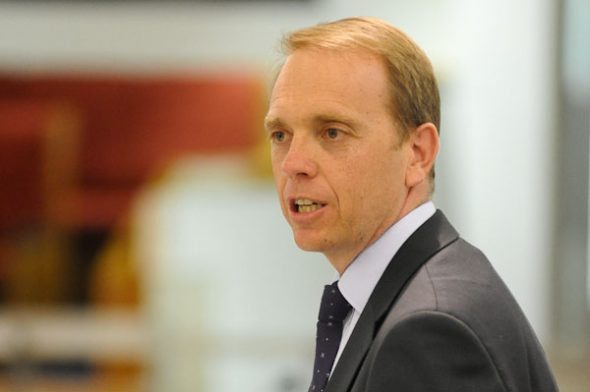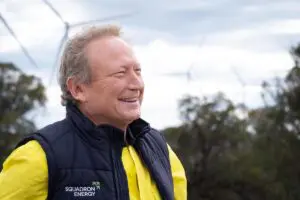Simon Corbell, the ACT minister leading its ambitious goal of reaching 90 per cent renewable energy by 2020, has slammed Treasurer Joe Hockey’s dismissal of wind turbines, and says he is “ashamed” of the federal government’s policy position on renewables.
Corbell says he was shocked by Hockey’s comments last week that the wind turbines at the Capital wind farm near Lake George, north of Canberra were “utterly offensive” and a “blight on the landscape.”
The ACT government wants to build 200MW of wind farms in the next few years to help meet its renewable goals, and expects some of these could be built in the region, including a possible extension to the Capital wind farm that Hockey finds offensive.
“It is deeply concerning that federal policy settings could be driven by Joe Hockey’s view of aesthetics as he drives down the Federal Highway,” Corbell told RenewEconomy in an interview on the sidelines of the Australian Solar Council conference in Melbourne.
“Wind farms in the ACT and the region deliver jobs, certainty and support for the agricultural sector, and they are making our city and our region a centre for renewable energy excellence.”
 However, Corbell says the federal Coalition’s policy on renewables, and its threats to remove or reduce the renewable nervy targets, and dismantle other institutions such as the Clean Energy Finance Corporation and defund the Australian Renewable Energy Agency.
However, Corbell says the federal Coalition’s policy on renewables, and its threats to remove or reduce the renewable nervy targets, and dismantle other institutions such as the Clean Energy Finance Corporation and defund the Australian Renewable Energy Agency.
“I’m ashamed from what we hearing from our federal leaders,” Corbell said. “Our federal leaders are locking us in to long-term price increases driven by vulnerability to the pricing of fossil fuels, whether that be coal or gas, and they should be taking a long-term view of the need to provide greater price certainty and lower cost energy by supporting the long-term development of renewable with a stable policy.
“Really, if the coalition says the country is open for business, it should be open for renewable energy as well.”
Corbell held a briefing for around 50 wind energy developers in the ACT this week, saying that there was a strong response to the territory’s auction process, which will see bidding for contracts for 200MW of wind energy, and he was very confident of obtaining a competitive price.
However, he warned that the poor policy signals sent from the federal government could have an impact, as it could mean that large international developers would choose to focus their efforts on other countries.
“The longer term risk of the winding back of policy such as the RET (renewable energy target) could reduce the number of market participants, and make it more difficult for them to get finance,” Corbell said.
“Larger renewable energy companies will ask themselves ‘why are they in this market” … and that could make it harder for their Australian subsidiaries to secure finance for an Australian project.”
Corbell said the ACT is now the only state or territory in the country to have greenhouse gas reductions written into law. Its target is to cut emissions by 40 per cent below 1990 levels by 2020, much of this through building efficiency and renewable energy.
“Switching to renewable energy is one of the most cost-effective and quickest ways to achieve emissions reduction,” he said.
“You can decarbonise a city like Canberra and do it a relatively low cost. If we can do it, other cities can do it too.”







